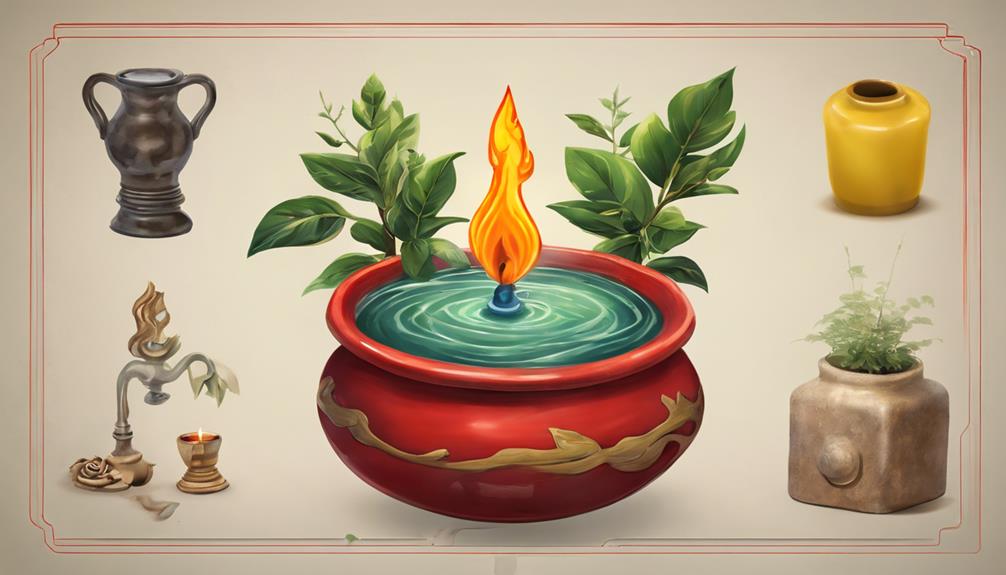Peek into the ancient secrets of Feng Shui to transform your space, fostering balance, harmony, and prosperity in your life.

How to Use Feng Shui
'As the saying goes, 'energy flows where attention goes', and in the realm of Feng Shui, you're aiming to direct that energy positively within your living and working spaces.
You might wonder how the placement of furniture or selection of certain colors can impact your life's quality. But, believe it or not, these ancient Chinese principles have been transforming environments and lives for centuries.
Ready to harness the power of Feng Shui? Stay tuned as we unravel the secrets that could just be the key to achieving balance, harmony, and prosperity in your own space.'
Key Takeaways
- Grasp basic Feng Shui concepts like the Five Elements and their interactions for effective application in spaces.
- Apply Feng Shui in living spaces by considering bedroom layout, bed placement, and kitchen positioning for enhanced well-being.
- Utilize Feng Shui principles in work environments to foster productivity, creativity, and positive energy flow.
- As a beginner, focus on understanding color meanings, relationship Feng Shui, and the importance of decluttering in maintaining energy flow.
Understanding Feng Shui Basics

Before diving into the practical application of Feng Shui, it's crucial that you grasp the basic principles and concepts that underpin this ancient Chinese practice. The origins of Feng Shui can be traced back more than 3,000 years to the time of the Zhou dynasty. It was a period when the Chinese began to observe and interpret the energy, or 'Qi', flowing through the environment and its effects on humans.
The cultural influence of Feng Shui is far-reaching and profound. Its principles have been used to shape not only individual homes but also the layout of cities and monuments. From the arrangement of the Forbidden City in Beijing to the design of contemporary skyscrapers in Hong Kong, the imprint of Feng Shui is apparent.
In essence, Feng Shui is about harmonizing your environment to enhance your well-being and fortune. It's not about superstition or aesthetic appeal, but rather, it's a complex system of mathematical calculations and interpretations aimed at maximizing the beneficial flow of Qi. Understanding these basics will serve as your foundation for applying Feng Shui effectively in your life.
The Five Elements of Feng Shui

To delve further into the practice of Feng Shui, let's explore its Five Elements – Wood, Fire, Earth, Metal, and Water – each representing different aspects of energy and holding a unique place in the cycle of creation and destruction.
Wood is the element of growth and creativity, symbolising the energy of springtime. Fire represents high energy and passion, reflecting the heat of summer. Earth signifies stability and nourishment, akin to the late summer harvest. Metal embodies structure and discipline, mirroring the crispness of autumn. Lastly, Water signifies wisdom and tranquility, reminiscent of the stillness of winter.
Element Interactions are central to Feng Shui, with each element feeding, controlling, or destroying others in a complex cycle. For instance, Wood fuels Fire, Fire makes Earth (ash), Earth bears Metal, Metal collects Water, and Water nourishes Wood. Conversely, Wood parts Earth, Earth absorbs Water, Water quenches Fire, Fire melts Metal, and Metal chops Wood.
Element Balancing is equally crucial. Too much or too little of an element can disrupt harmony and affect your life areas. By understanding these dynamics, you can harness the power of these elements, bringing balance, prosperity, and peace into your surroundings.
Feng Shui and Your Home

Harnessing the principles of Feng Shui in your home can transform your living space into a haven of balanced energy and tranquility. Your home's layout, particularly the bedroom arrangement and kitchen positioning, play critical roles in achieving this balance.
In Feng Shui, the bedroom is a sanctuary of rest and rejuvenation. It's essential to place your bed in a 'commanding position' – ideally, it should be facing the door but not directly in line with it, as this promotes a sense of security and control. Avoid placing your bed under a window or sloped ceiling, as this can lead to disturbed sleep and depleted energy.
Kitchen positioning is equally important in Feng Shui. The stove, representing wealth and nourishment, should ideally be positioned so you can see the door while cooking, but shouldn't be in direct line with it. If possible, keep your stove away from the sink – the clash of fire and water elements can create a disruptive energy.
Incorporating Feng Shui into your home isn't just about furniture placement. It's about creating a harmonious flow of energy that enhances well-being, peace, and prosperity. Remember, it's your space – make it work to your advantage.
Feng Shui in the Workplace

Just as Feng Shui principles can transform your home into a haven of balanced energy, they can also be applied in the workplace to foster productivity, focus, and positive interactions. Improving productivity through Feng Shui starts with the understanding that energy flow can impact your mood, creativity, and efficiency.
Incorporating Feng Shui in office design involves the careful selection and placement of furniture, artwork, plants, and other items. For instance, your desk should ideally face the entrance, as it's considered the power position and helps you feel more in control. Natural light is also crucial – it stimulates energy and lifts spirits.
When it comes to artwork, opt for pieces that spark joy and inspiration. Avoid images that depict loneliness or conflict as they can subconsciously affect your mood. Use plants to improve indoor air quality and promote positive energy. The bamboo plant, in particular, is a Feng Shui favorite due to its resilience and ability to grow in various conditions.
Tips for Feng Shui Beginners

Embarking on your Feng Shui journey might seem daunting at first, but with a few simple tips, you'll be able to harmonize your living or working space effectively. The key is to understand that Feng Shui is about energy flow and balance.
An essential tip for Feng Shui beginners is understanding the importance of colors. Feng Shui colors have different meanings and can affect your mood and energy. For instance, green signifies growth and renewal, while red symbolizes passion and energy.
Another important aspect is Relationship Feng Shui, which focuses on improving the energy flow in your relationship area. This can be done by keeping this area clutter-free and using pairs of objects to symbolize harmony.
Here's a quick guide to get you started:
| Feng Shui Tip | Description |
|---|---|
| Feng Shui Colors | Use colors that bring the desired energy into your space. |
| Relationship Feng Shui | Keep the relationship area of your home clutter-free and balanced. |
| Declutter | Remove unnecessary items to allow energy to flow freely. |
Common Feng Shui Misconceptions

While you're getting the hang of Feng Shui basics, it's crucial to be aware of some common misconceptions that could hinder your progress. Many of these have their roots in misunderstanding or misinterpretation of the principles, hence the importance of understanding misconception origins.
One prevalent myth is that Feng Shui is all about superstition. This couldn't be further from the truth. In reality, Feng Shui is more about understanding the energy flow within a space and using design principles to optimize that energy. It's less about luck and more about creating a harmonious environment.
Another common misconception is that Feng Shui is a quick fix for all problems. It's not an overnight solution and requires patience to truly see the benefits. You can't just move a couple of items around and expect instant results; it's about creating a balanced environment over time.
Lastly, many believe that Feng Shui is solely an Eastern concept. Yes, it originated in China, but its principles are universal and can be applied anywhere. Don't let cultural misconceptions deter you from experiencing the benefits of Feng Shui. In essence, it's about balance, harmony, and enhancing the quality of life, irrespective of where you live.
Frequently Asked Questions
How Can I Incorporate Feng Shui Into My Garden Design?
To incorporate Feng Shui into your garden design, consider plant placement and water features. Position plants thoughtfully to encourage positive energy flow. For example, lush plants near the entrance attract good fortune.
Water features like fountains or ponds should be clean and flowing, symbolizing wealth flowing into your life. Remember, it's not just about placement, but also nurturing your garden and maintaining balance. It's a holistic approach to creating a harmonious outdoor space.
Can Feng Shui Principles Be Applied to a Vehicle or Mode of Transportation?
Absolutely, you can apply Feng Shui principles to your vehicle.
Consider vehicle positioning; the direction your car faces when parked can impact energy flow.
Also, color significance plays a role. Colors correspond to different elements in Feng Shui. For instance, a black car symbolizes water and wisdom, while red represents fire and power.
Are There Any Specific Feng Shui Practices for Attracting Wealth or Love?
Absolutely, there are specific practices for attracting wealth or love.
You'd place prosperity symbols, such as coins or money trees, in the southeast corner of your space to enhance wealth.
For love, you'd focus on the southwest or 'love corner'.
Here, you'd place pairs of objects or symbols of love.
It's all about creating a balanced, positive energy flow in these specific areas to attract what you're seeking.
How Does Feng Shui Relate to Other Traditional Chinese Philosophies or Practices?
Feng Shui's deeply intertwined with other Chinese philosophies like Taoism and Confucianism. Taoism's concept of 'chi' or energy flows underpins Feng Shui's design principles. You're manipulating this energy to create harmony.
Confucianism's influence on Feng Shui is evident in its emphasis on order and hierarchy. Both philosophies contribute to Feng Shui's goal of balancing energy in your surroundings for prosperity and well-being.
Can Feng Shui Be Used to Enhance Personal Health and Well-Being?
Absolutely, you can use Feng Shui to enhance your personal health and well-being.
Health Feng Shui focuses on creating a balanced environment to promote good energy flow, which can reduce stress. It's about arranging your space to maximize positive energy.
Conclusion
Mastering Feng Shui isn't a one-day task, but by understanding its basics, acknowledging the five elements, and applying it to your home and workplace, you're making a good start.
Don't be deterred by misconceptions, and remember, everyone was once a beginner. Stay patient, keep learning, and you'll soon see how Feng Shui can harmonize your spaces, creating a greater sense of balance and well-being in your life.
Good luck on your Feng Shui journey!



Sign up